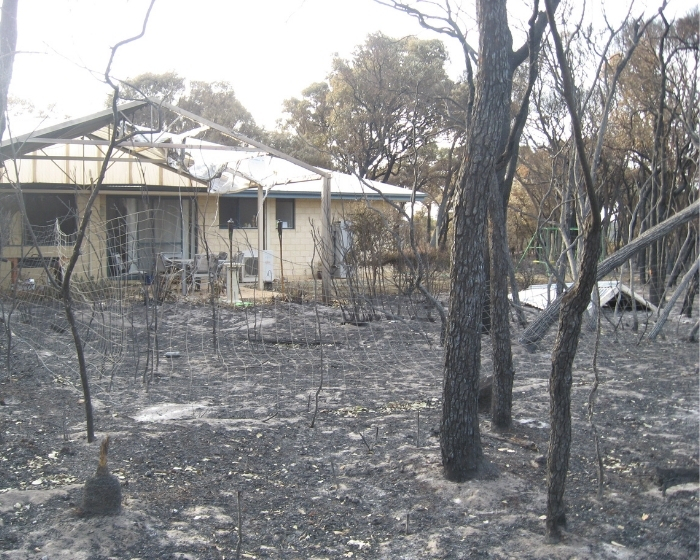As many of Australia’s bushfire affected communities are still struggling to get back on their feet since last year’s horror bushfire season, people are once again preparing for another harsh summer.
To aid churches in these areas, a resource booklet recently went out to Uniting Church WA congregations to assist them in ministering to disaster affected communities. It provides advice for congregations on preparation, intervention and post-disaster support.
Mary Elton, member of Margaret River Uniting Church, knows all too well the terrifying nature of bushfire, having lived through devastating fires in 2011. Her property was one of a few which survived in her area.
“We were down at the river mouth for about four hours or so, the fire was still heading towards that direction as well,” Mary said. “There was quite a few people down there, nobody really knew what was going on. It was pretty scary.
“We were surprisingly calm really when I look back at it; how we got through that time.
“We had done a lot of preparation because we did live in the bush.”
As well as practical preparedness, such as cleaning gutters, putting their sprinklers on and closing up the house, Mary said planning how to get out of a fire is vital, as you often can’t think straight when faced with an emergency. Having a ‘Plan B’ in place for when ‘Plan A’ doesn’t work is also important, as is a plan for any pets you might have, and a way to look after important documents.
“We had an emergency kit which the Red Cross and the Department of Fire and Emergency Services have some fantastic information about,” Mary said.
Claire Silveira, Red Cross Community Resilience and Recovery Officer, leads emergency preparedness training for all types of emergencies, including but not specific to bushfires. Most of their training is around psychosocial preparedness. Claire said that one in three people in Australia will go through a major emergency in their lives, and that taking the time to learn emergency preparedness is important for us all – not just those in bushfire prone areas. A lot of the training is about managing our personal reactions during stress.
“Emergencies and disasters are stressful – that’s a fact,” Claire said. “When we’re stressed we don’t necessarily make good decisions.
“One of the keys we’ve found is to remain calm, and that can help us make better decisions. So the key is having really good stress management techniques.”
Claire teaches stress management techniques using ‘AIM’: Anticipate how you react when you’re stressed; Identify thoughts and feelings you have when stressed; and Manage your reactions and emotions through mindfulness techniques.
“There’s not a lot of point in waiting for an emergency to put these things in place, you need to embed these in your day-to-day life so that when something happens you can draw upon those skills,” she said. “Have you ever seen someone in your life, or experienced it yourself, where you’ve had brain freeze? Where you’re so overwhelmed with things that you can’t do something?
“In the moment, if you haven’t done any preparedness then people aren’t able to cope with that stress. And sometimes people are quite surprised with how they react.
“We know that people who do some form of preparedness, even just a little bit, are able to cope better and they recover faster.
“We know that, whether you believe in climate change or not, emergencies are becoming more frequent. Weather extremes are increasing: it’s getting hotter, it’s getting wetter, we have bigger storms, and more flooding. There are more events happening than there used to be and there’s good reasons for getting prepared.”
Local churches also play a role in disasters and emergencies. Rev David Jackson, Convenor of the Disaster Relief and Community Recovery Committee, said there are a number of things churches can do to prepare for disaster.
“The first thing is to build a network of people who can be contacted,” David said. “An up-to-date pastoral contact list is one of the most important things for any church to have in place. From experience, we know that it is essential that all those from the congregation who are likely to be impacted are contacted. People who have been inadvertently ignored during disaster situations have experienced unnecessary trauma.
“Appoint one person from the congregation who is dedicated to co-ordinate any crisis response.
“Make an inventory that includes buildings, storage space, kitchen, laundry, shower, toilet, car parking and areas that can accommodate animals, and plans to make prepared meals and toiletry packets for men and women as examples.”
All of this information, David said, can be incorporated in your congregation’s own Disaster Resilience Plan. One of the most important ways churches can assist their communities in times of disaster is through connection.
“Recovery is a marathon and not a sprint,” David said. “Connections are the number one thing congregations can do to quarantine themselves from future shock.
“Faith communities play a pivotal role in supporting recovery and resilience – you know and understand your community, you know the stress points and vulnerabilities of your communities better than anyone else.
“You are also there for the long haul. You are the known and trusted faces and places.
“To do this work you need to sustain your service and your core business to meet increased demand. Look for opportunities to integrate your existing service delivery with the disaster recovery activities. Think and act collectively by avoiding working in silos and don’t add to community confusion and fatigue.”
For more information on Red Cross Emergency Preparedness programs visit redcross.org.au/prepare or follow them on Facebook at Red Cross Emergency Services WA.
To get in touch with the Uniting Church WA Disaster Relief and Community Recovery Committee for assistance in developing a congregational plan for disaster preparedness, or for a copy of Good Advice for Churches, Congregations and Faith Groups Ministering in Disaster-affected Communities, contact Rev David Jackson at de.jackson@bigpond.com.
Heather Dowling
